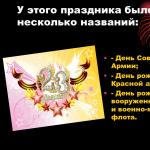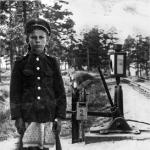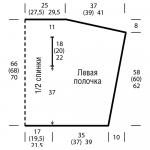Presentation "February 23 - Defender of the Fatherland Day" presentation for a lesson (grade 7) on the topic. Presentation "February 23 - Defender of the Fatherland Day" presentation for a lesson (7th grade) on the topic February 23, history of the holiday presentation
Target:
- Introduce students to the history of the holiday Defender of the Fatherland Day.
- Remember the glorious exploits of our fellow countrymen.
- Continue to cultivate a sense of pride for your people and love for the Motherland.
Classroom design and equipment:
- illustrations on military themes, drawings;
- military professions, photos of defenders of the Fatherland;
- a selection of books about the defenders of the Motherland;
- tape recorder, TV, TSO - DVD,
- song “My Russia has long eyelashes;
- the poem “Glory to Russia for centuries!”;
- song “Officers” by O. Gazmanov.
Progress of the class hour
1. Introductory part.
Students read a poem.
1st student:
The winds blow in February
The pipes howl loudly.
Like a snake rushes along the ground
Light drifting snow.
2nd student:
Rising and racing into the distance
Aircraft flights.
It celebrates February
The birth of the army.
2. Introductory speech by the teacher.
Teacher:
– On February 23, the whole country will celebrate a great holiday – Defender of the Fatherland Day. The word “Fatherland” has the same root as the word “father”, “Fatherland”, “father’s house”, “father’s land”. The Fatherland is our country, the Motherland.
– What can be called the Motherland?
Children:(read all together)
Great land
Beloved land
Where we were born and live
We are the bright homeland,
We are the bright homeland,
We call it our Motherland!
– What is the name of our big Motherland?
Children: Russia.
Teacher:
– A lot of songs and poems are dedicated to Russia.
– Now we will perform one of the songs dedicated to Russia and find out Who else can you call Russia your homeland?
“My Russia has long eyelashes.”
1st verse:
My Russia has long braids.
My Russia has light eyelashes.
My Russia has blue eyes.
Russia, you look a lot like me.
The sun is shining, the winds are blowing,
Whirlwinds swirl over Russia.
There's a colorful rainbow in the sky
There is no more beautiful land.
2nd verse:
For me, Russia is wonderful birch trees.
For me, Russia is morning dew.
For me, Russia is the most precious thing you are.
How much you look like my mother.
The sun is shining, the winds are blowing,
Whirlwinds swirl over Russia.
There's a colorful rainbow in the sky
There is no more beautiful land.
– So who else is Russia similar to?
Student: – To mom.
Teacher:
– Listen to a recording of one of the poems about Russia: “Glory to our Russia forever.”
- Guys, do you know why the whole country celebrates Defender of the Fatherland Day on February 23?
The student tells the story of this holiday.
At the beginning of 1918, taking advantage of the difficult situation in which the country was, German troops launched an offensive against Soviet Russia. A real threat has arisen to the Russian capital Petrograd. A new army was created - the Red Army. She fought back the aggressor. The beginning of the widespread formation of detachments and units of the Red Army was February 23, 1918. This day was declared a holiday - Red Army Day. In 1946, the Red Army was renamed the Soviet Army, and the holiday was accordingly called Soviet Army Day.
And on February 10, 1995, the State Duma of Russia adopted the federal law “On the Days of Military Glory of Russia,” in which this day is called “Day of Defender of the Fatherland.”
Teacher:
– Love for their Motherland, for their Fatherland raised people to heroic deeds. Many heroes died defending their Fatherland. Their names have become symbols of courage and honor for us.
– Our Motherland was defended by different people at different times: they dressed differently, owned different weapons.
– We will now take a short excursion through the historical timeline and remember the events that are associated with these defenders of our Motherland.
– Remember the names of the epic heroes?
Student:
– Ilya Muromets, Alyosha Popovich, Dobrynya Nikitich.
Teacher:
– And from the history of Ancient Rus'?
Student:
1. Great commander-Alexander Nevsky, who, in difficult times for Rus', was able to unite the people around himself and prevent European knights from conquering our Rus'. This battle was called the Battle of the Ice. This was in the 13th century.
Teacher:
– And from the history of the formation of the Moscow State?
Student:
2. Great commander Dmitry Donskoy in 1380, with his troops, he defeated the Horde yoke on the Kulikovo field, across the Don River, and his great-grandson, the Great Sovereign Ivan III, united most of the Russian lands under the rule of Moscow and freed them from Horde dependence. Thus began new times in the history of our country - times of the Moscow state. This was in the 14th century.
3. Commander Dmitry Pozharsky and city mayor of Nizhny Novgorod Kozma Minin in 1612 they created a people's militia, i.e. an army of ordinary people - townspeople and peasants - and drove out the Polish invaders. The holiday of November 4, National Unity Day, is associated with this battle.
4. Alexander Vasilievich Suvorov- began his service as a soldier and rose to the highest military rank - generalissimo. He never lost a single battle in his entire life. Suvorov said: “They win not with their minds, but with their skill.” His soldiers, who were called miracle heroes, stormed the impregnable Turkish fortress of Izmail, defeated the French in Italy, and won many other victories. He also led his army out of encirclement by fighting through the passes of the Alps.
This was during the 18th century.
5. Great commander - Mikhail Illarionovich Kutuzov became famous in the Great Patriotic War of 1812. All the soldiers loved him, all of Russia hoped for him. It was he who chose the Battle of Borodino for the decisive battle with Napoleon’s army and won it. This was during the 19th century.
6. Georgy Konstantinovich Zhukov.
In the 20th century, to all these names the names of great commanders were added Great Patriotic War– G.K.Zhukov, A.M.Vasilevsky, I.S.Konev, R.Ya.Malinovsky, K.K.Rokossovsky, S.K.Timoshenko, and many others. During the four-year period of struggle against German aggression, more than one battle took place in which they showed their ingenuity and ingenuity to defeat the enemy.
Teacher:
– You can endlessly list the names of our defenders: commanders, officers who participated in various wars – Afghan, Chechen. We will never forget their names!
Teacher:
- Tell me, guys. What types of troops exist in the Russian Armed Forces?
Children:
- Land.
- Air Force.
- Navy.
- Strategic Missile Forces.
Teacher:
– What military professions do you know?
Children list:
Teacher:
– Who is most needed in the Army?
– It is impossible to answer this question.
– Which finger is more needed?
- Everyone is needed.
– You can’t hit with one finger –
- You need to clench all your fingers into a fist,
“And the enemy will receive a strong blow when rocket men, tank crews, pilots, sailors and airborne paratroopers hit him together.”
– What lines can be dedicated to each profession?
(Children read poetry.)
Tankman.
Everywhere, like an all-terrain vehicle,
The tank will pass on tracks
The gun barrel is in front,
It's dangerous, enemy, don't come near!
The tank is protected by strong armor
And he can face the fight!
Pilot.
He's a metal bird
Will lift you into the clouds.
Now the air border
Reliable and strong!
Military doctor
Soldier at enemy heights
Was wounded early this morning.
A brave military doctor will save,
He will bandage the wounds!
A doctor removes a soldier from his wounds
Two small fragments
And he will say: “There is no need to be discouraged!
Live long, brother!”
Sapper.
The war is long over
But she left a mark -
It happens among the beds
The shells are buried.
And the sapper will come with the equipment,
To neutralize the field.
There will be no explosions from now on,
Troubles, and tears, and pain!
Paratrooper.
Paratroopers in minutes
Descending from heaven.
Having unraveled the parachutes,
They'll comb the dark forest,
Ravines, mountains and meadows.
They will find a dangerous enemy.
Sailor.
On the mast is our tricolor flag,
A sailor is standing on the deck.
And he knows that the seas of the country
Ocean boundaries
Both day and night there must be
Under watchful guard!
Submariner.
Here is a wonderful picture -
Coming out of the depths
steel submarine,
It's like a dolphin!
Submariners serve in it -
They are both here and there
They circle under the surface of the water,
Protect the border!
Artilleryman.
Long live the artillerymen -
Defenders of our lands,
Carriers of our shells,
Gunners hitting the target!
Border guards.
The birds fell asleep on the branches,
The stars don't shine in the sky.
Hidden by the border
Border guard detachment.
Border guards are not asleep
At the native border:
Our sea, our land
Our sky is being guarded!
Teacher:
- So you can answer the question - who is needed more by the Army?
Children:
- No. All military professions are needed by the Armed Forces! They are all connected.
4. Conclusion
– Oleg Gazmanov will perform a song dedicated to all officers.
Listening to the song “Officers”.
Teacher:
– Many of our victories are due to our soldiers. Our country has always been and is famous for its heroes.
(As the clock ticks, the children stand up and a minute of silence is held.)
1st student:
We will remember your names
And bequeath the memory to future generations.
Heroes don't go away forever
They are not in danger of cold oblivion.
2nd student:
The sons of Russia are growing up again
And they are ready to serve the Motherland,
So that the sun does not disappear into the night forever,
And in the morning it illuminated the earth again.
3rd student:
Let the sky be blue
Let there be no smoke in the sky,
Let the menacing guns be silent,
And the machine guns don’t fire,
So that people and cities can live...
Peace is always needed on earth!
4th student:
Russian warrior takes care
Peace and glory to my native country.
He is on duty - and so are our people.
He is rightfully proud of the Army.
Defender of the Fatherland Day. Today is a holiday of all those who defended, are defending and are ready to defend the Fatherland. We stand at the post, platoon and squadron, Immortal as fire, calm as granite. We are the army of the country, we are the army of the people, Our history preserves our great feat.
Today marks one of the days of military glory of Russia - Defender of the Fatherland Day. This date was established by the Federal Law “On Days of Military Glory and Memorable Dates of Russia”, adopted by the State Duma and signed by the President of the Russian Federation B. Yeltsin on March 13, 1995.
It was generally accepted that on February 23, 1918, the Red Guard units won their first victories near Pskov and Narva over the regular troops of the Kaiser’s Germany. These first victories became the “birthday of the Red Army.”
Since 1946, the holiday began to be called the Day of the Soviet Army and Navy. In 1922, this date was officially declared Red Army Day. Later, February 23 was celebrated annually in the USSR as a national holiday - the Day of the Soviet Army and Navy.
After the collapse of the Soviet Union, the date was renamed Defender of the Fatherland Day. For some people, the holiday of February 23 remains the day of men who serve in the army or in any law enforcement agencies.
However, most citizens of Russia and the countries of the former USSR tend to view Defender of the Fatherland Day not so much as the anniversary of the victory or the Birthday of the Red Army, but as the Day of real men, Defenders, in the broadest sense of the word.
Among the holiday traditions that have been preserved today in the former Soviet republics are honoring veterans, laying flowers at memorial sites, holding festive concerts and events, and organizing fireworks displays in many cities.
This holiday represents everything that women value in men: courage, strength, care and responsibility.
Defender of the Fatherland Day is a holiday primarily for the military. But at the same time, this is a holiday for all men, those who are ready at any moment to get into formation in order to defend their loved ones, their loved ones and their homeland with arms in hand. And since protecting the weak has always been an activity for real men, Defender of the Fatherland Day has long been firmly associated in our minds as a men’s holiday.
This holiday, from the moment it appeared in our calendar, remains unchanged in its content and the level of popular love for it, but at the same time, Defender of the Fatherland Day also has a very interesting history. Suffice it to say that during its existence it was renamed several times and arose under rather interesting circumstances.
What was the name of the holiday of all men in different years of our history: 1919 -1946 Day of the Workers' and Peasants' Red Army 1946-1992 (to May 7) Day of the Soviet Army and Navy 1993 - 1994 Day of the Russian Army 1995 - 2012 Day of Defender of the Fatherland Since 2002 – Defender of the Fatherland Day is a public holiday
We praise those who did not cry From their pain, But did not hide their tears On the graves of friends, Those who were a man Not in words, Did not celebrate a coward, Sitting in the bushes, Those best Sons of humanity, Those who guard the Fatherland!
Even if service and work are not always easy, We wish you to live, love, work, And if a lucky star smiles on you, Then you will rise to the rank of general. Congratulations on the holiday - Defender of the Fatherland Day!
February is the harshest month of the year! Maybe that's why the biggest and most severe men's holiday appeared in February?! By protecting our Motherland, you protect us - all those who need your strength and support. Congratulations to you - soldiers of our happiness and safety! We love you!
MBOU Secondary School No. 76 Siroshtanova E.A. year 2014

Now this holiday is called the Day of Defenders of the Fatherland. Why is February 23rd considered Defenders of the Fatherland Day, and not any other date? The history of this holiday is as follows: Immediately after the victory of the armed uprising in Petrograd in October (November 7-8, new style) 1917, counter-revolutionary protests fell on the young Soviet Republic, and the Soviet government had to actively fight them. At that time, the Armed Forces of Soviet Power were the Red Guard detachments of revolutionary soldiers and sailors.

In order to protect the Soviet state from Kaiser Germany, the Soviet government began organizing regular armed forces. On January 15 (28 according to the present day) 1918, the Chairman of the Council of People's Commissars V.I. Ulyanov (Lenin) signed the decree "On the organization of the Workers' and Peasants' Red Army (RKKA), and (11.02 according to the present day) - the decree" On the organization of the Workers' and Peasants' Red Fleet" (RKKF). On February 18, 1918, Austro-German (there were 39 German divisions) and Turkish troops, violating the truce that was concluded on December 2 (15), 1917, invaded Soviet Russia and began occupation of Ukraine, Belarus and the Baltic states. On February 21, German troops captured Minsk. On this day, the Soviet government addressed the people with the slogan “The Socialist Fatherland is in danger!”

On February 23, 1919, Red Army Day was held in Petrograd under the slogan of defending the socialist Fatherland from the “Kaiser’s troops” (in the documents of that time, “German” or “German” troops were not used, but only “Kaiser’s”). At a meeting of the Petrograd Council of Workers and Red Army Deputies, dedicated to the anniversary of the creation of the Red Army, the Chairman of the All-Russian Central Executive Committee, Ya. M. Sverdlov, made a welcoming speech, emphasizing that the Red Army was created primarily against a foreign enemy. In 1923, in honor of the Day of the Red Army and Navy, an order of the Revolutionary Military Council of the Republic was first issued.

Later, the All-Russian Central Executive Committee decided to combine the anniversary of the Red Army with another propaganda event - the so-called “Red Gift Day”. Soon, Pravda notified the workers: “The organization of the Red Gift Day throughout Russia has been postponed to February 23. On this day, celebrations of the anniversary of the creation of the Red Army will be organized in cities and at the front...”

And yet, initially February 23 was celebrated as the birthday of the Red Army in honor of the victory near Narva and Pskov over German troops. The day of the first victory became the army's birthday. This seemed to indicate her fate for the future. Starting with victory, she has since crushed the enemies of the Motherland more than once. There was not a single invader who did not feel the power of her weapons. The army began to be called Soviet, and February 23 was celebrated annually in the USSR as a national holiday - the Day of the Soviet Army and Navy, to commemorate the general mobilization of revolutionary forces to defend the socialist Fatherland, as well as the courageous resistance of the Red Army to the invaders. After the collapse of the USSR, February 23 was renamed Defender of the Fatherland Day.

So, for several decades now, on February 23, we have been widely and publicly celebrating the holiday of Defender of the Fatherland; we celebrate it with dignified solemnity and special warmth. For everyone, victory is the greatest feat of the people in the entire world history, but this is a tragedy that under no circumstances should ever happen again.

The history of the holiday on February 23 is an integral part of the history of the whole country. It is full of dozens of state, political and social facts that repeatedly change the fate of a multi-million people. The history of February 23 should be known to both adults and children, at least in brief form. After all, Defender of the Fatherland Day is not only a tribute to the memory and honor of military personnel, but also a real celebration of brave and courageous civilian men who are ready to stand up to defend their Motherland at any necessary moment.
February 23 – the history of the holiday from its origins to the present day

Back in 1918, on January 15, the Council of People's Commissars of the USSR issued a decree on the creation of the Red Army. At that moment, Austro-Hungarian troops were actively advancing and easily squeezed out the cities without encountering any resistance. Pskov, Minsk, Revel, Narva... One after another they passed into the power of the conquerors. By the second ten days of February, the situation at the front was catastrophic, and the young proletarian country could only count on a miracle.
On February 23, the Council of the People's Commissar of the USSR issues an appeal to the people, “The Socialist Fatherland is in Danger.” A day later, Commander-in-Chief N. Krylenko calls on the people to take up arms and defend their howling country. From this moment on, mass demobilization begins, the ranks of military personnel are replenished. In the end, resistance was provided to the enemies, and as a result, the Brest Peace Treaty was signed. The result is that the young republic was able to defend its rights. This history of the holiday on February 23, from its origins to the present day, has long been familiar to many. But does it fully correspond to reality? Or is there another historical line in the origin of the holiday that is popular today, February 23?
Why is Defender of the Fatherland Day celebrated on February 23?

Just 20 years ago, dozens of historians argued about the events that occurred on February 23, 1918. But finally the controversy subsided - everything became obvious. Not a single copy of the Bolshevik press of that period contained any note about the valiant defeat of the German troops. Quite the contrary, already on February 25, 1918, the Bolsheviks accelerated the recruitment of people into the ranks of the Red Army, expecting a crushing blow to the capital. Moreover, the capital itself was moved to Moscow, which was notified to comrades in advance on February 26.
The question of why Defender of the Fatherland Day is actually celebrated on February 23 begs itself. After analyzing the documents and notes of the then media, it becomes obvious: February 23-24 is the period of Russia’s unconditional surrender to Germany. But in order to raise the spirit of the people and inspire the public to heroism, the day of consent to the given conditions was timed to coincide with an important event - the formation of the Workers' and Peasants' Red Army.
A brief history of the holiday February 23rd for children

When telling children a brief history of the holiday on February 23, you should not be like cunning political scientists and historians who refute everything positive and confirm the fact of surrender on the above date. After all, it is much more important for schoolchildren to feel the spirit of heroism and patriotism. Explain to the children that the Motherland is our land, where we grew up, it is sacred and precious for every Russian person. And all the men who once came to her defense, or are ready to defend her today, are already heroes in the eyes of each of us. To strengthen knowledge and increase the information base, give schoolchildren a brief tour of the changes that have occurred with the holiday on February 23 over the long years of history.
How has the holiday of February 23 changed historically?

Over the years in our history, the same holiday has changed under the influence of military, political or social factors. This is what the historical changes in the celebration of Russian men look like:
- 1919-1946 – Day of the Workers' and Peasants' Red Army;
- 1947-1992 – Day of the Soviet Army and Navy;
- 1993-1994 – Russian Army Day;
- 1995-2016 – Defender of the Fatherland Day;
History of February 23: video presentation

February 23 is an important and solemn day. Its history dates back to the beginning of the 20th century and is still not finished. The holiday Defender of the Fatherland Day is celebrated annually in our country. Men, guys and boys are congratulated with gifts and poems, they wish to become real heroes for their family and Motherland. It is not surprising that on the eve of the calendar date, kindergartens, schools and universities hold lectures and show video presentations about the history of February 23. Every conscious child should understand how heroically their ancestors acted and follow their example.
TEXT FOR PRESENTATION
In fairy tales and legends, the defenders of the Russian Land were heroes. These defenders were depicted by the artist V.M. Vasnetsov in his famous painting “Bogatyrs”. Three mighty warriors in battle armor stand patrol on the border of the principality. Their stern faces are concentrated. In the center is Ilya Muromets. He carefully looks into the distance to see if the principality is in danger, if enemies are visible anywhere. A heavy mace hangs from his hand, and a spear is thrown across his horse. Dobrynya Nikitich tightly grips a sword in her hands, and Alyosha Popovich holds a bow at the ready. Each one has a strong, reliable shield, his chest is covered with chain mail, and his head is protected by a helmet.
In any country there are people whose profession is to protect the state from enemies. In ancient times, the defenders of Rus' were warriors. They wore armor and were armed with swords, knives, maces and battle axes. They also used a bow and crossbow. Russians have always been considered brave warriors. And in one-on-one combat, victory was almost always on their side.
To protect the country from attack from the sea, Tsar Peter the Great built warships. These ships could get in the way of the enemy and protect our shores.
More than two hundred years ago, Napoleon and his army attacked our country. Many countries and peoples submitted to him, but not the Russians. In those days, the basis of any army was cavalry. Cavalry was divided into light and heavy. Hussars are light cavalry. On their horses they pursued the enemy and also carried out reconnaissance operations. These were desperate brave men who panicked the French soldiers.
At the beginning of the 20th century, new, never-before-seen equipment appeared - tanks, airships, airplanes. Therefore, victory in battle depended on how well the army was technically equipped. Rapid-fire weapons begin to appear: machine guns, machine guns, mortars... To protect themselves from so many bullets and shells, all equipment begins to be “dressed” in armor. This is how armored vehicles appear: armored cars, armored trains, tanks and battleships - warships.
Russia is a great maritime power. Seas and oceans wash it from all sides. And everywhere the St. Andrew’s flag flies proudly over the waves - the main flag of the Russian Navy. The newest warships can hunt submarines, launch missiles and serve as an airfield for planes and helicopters.
Every navy has surface ships and submarines. The main advantage of a submarine: it can stay under water for a long time. Russian submariners were the first in the world to sail under the ice of the Arctic Ocean and surface at the North Pole. And besides this, our submarine made an “underwater circumnavigation” - it circumnavigated the globe without a single ascent.
Artilleryman is a profession that has existed for a long time. Previously, they fired stone cannonballs that fell close to the cannon, but now they control rockets that fly so far that you can see where they exploded with binoculars. Currently, there are many artillery installations: anti-aircraft guns, for firing at aircraft; anti-tank guns; special mountain artillery. And on the eve of the Great Patriotic War, rocket artillery, the Katyusha, was born in the country.
Tank units are the backbone of any ground army. Modern tanks can swim and even hide under water. Inside the tank there is a whole crew: commander, gunner, mechanic and radio operator. The most famous tank of the Great Patriotic War is the T-34 tank. With his cannon, he penetrated the armor of any German tanks, while his armor easily withstood the blows of enemy shells. The Nazis were stunned by the appearance of this tank on the battlefield. The contribution of our tank soldiers to the Victory in that terrible war was great.
Protecting the state border is an important and responsible task. There are people who are trying to secretly cross our border. These violators are detained by border guards. They always want to outsmart the border guards. But the border guards still catch them, and specially trained dogs help them with this. At the border outpost they are always ready for battle. Border guards vigilantly carry out their difficult service day and night.
Paratroopers are military specialties that have emerged quite recently. Marine and airborne troops form the basis of a modern army; they are part of the rapid reaction forces. Marines suddenly appear on fast ships and parachute ashore. And airborne troops jump with parachutes directly from airplanes. And along with them, special light tanks, armored vehicles and guns land on special parachutes.
Defending the Fatherland is a very responsible job. A very difficult specialty is a military pilot. Military aircraft and helicopters are different from civilian ones. They are more complex, fly faster and higher than conventional aircraft, and in addition, carry weapons capable of hitting the enemy.






